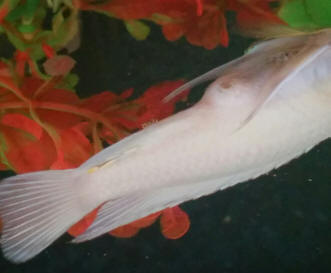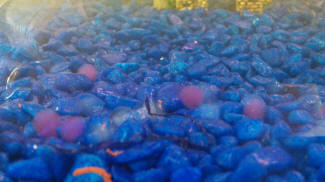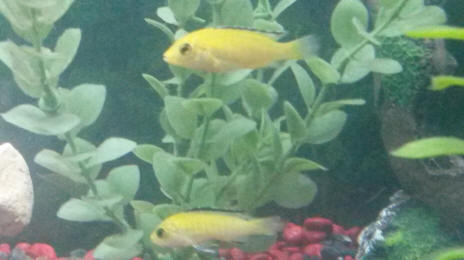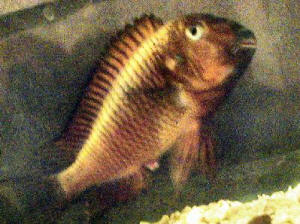|
FAQs on African Cichlid Nutritional Disease
FAQs on African Cichlid Disease:
African Cichlid
Disease 1, African Cichlid Disease 2,
African Cichlid Disease 3,
African Cichlid Disease 4,
African Cichlid Disease 5,
African Cichlid Disease 6,
African Cichlid Disease 7,
African Cichlid Disease 8,
FAQs on African Cichlid Disease by Category:
Diagnosis,
Environmental,
Social, Infectious (Virus,
Bacterial, Fungal), Parasitic (Ich, Velvet...),
Genetic,
Treatments,
Related Articles: African Cichlids,
Malawian Cichlids: The Mbuna and their Allies By Neale Monks,
The Blue
Followers: the Placidochromis of Lake Malawi by Daniella
Rizzo, Cichlid Fishes,
Related FAQs: Cichlid Disease,
Cichlid Disease 2,
Cichlid Disease 3,
African Cichlids in General,
African Cichlid Identification,
African Cichlid Selection,
African Cichlid Behavior,
African Cichlid Compatibility,
African Cichlid Systems,
African Cichlid Feeding,
African Cichlid Reproduction,
Cichlids of the World,
Cichlid Systems,
Cichlid Identification,
Cichlid Behavior,
Cichlid Compatibility,
Cichlid Selection,
Cichlid Feeding,
Cichlid Disease,
Cichlid Reproduction,
|
|
|
Mysterious cichlid sickness
2/5/15
Internal Lake Malawi Cichlid Disease
Hi, I have been looking all over the internet for an answer to my tank
troubles but have yet to find an article that can explain what I am
currently dealing with. I'm going to attach a picture of the fish I lost
yesterday morning. I had 3 cichlids and an algae eater in a 20
gallon tank. Our white cichlid, not exactly sure what kind of
cichlid sorry, died suddenly but for a few weeks he was acting a bit
strange. He was constantly twitching, flopping on the pebbles, darting
across the tank etc...Then I noticed his tummy looked almost black and I
figured maybe he is actually a she and she's pregnant. Over about a
weeks time the fish dug itself what I thought was a nest in the pebbles.
He dug all the way down to the glass, this nest was about the size of a
baseball around. He became territorial of that spot and wouldn't let the
other 2 cichlids near it. He was eating normally and everything. I woke
up yesterday morning to him floating upside down with a perfect hole in
his stomach (or I guess anus) almost as if something ate him from the
inside out....and on the bottom of the tank there were these weird jelly
like balls about the same size as the pebbles. There were purple ones
and see through ones, which I'll also attach a picture of. Now that same
morning I woke up to the dead fish, my yellow cichlid who naturally has
a black stripe down his top and bottom fins, is also struggling to stay
alive. He has dark stress stripes down his body, his mouth was pushed as
far open as he could get it as if he's gasping for air, and he was
staying at the bottom of the tank in one corner. The lady we get our
fish from told me its definitely ammonia poising but doing a water
change did absolutely nothing. We put the yellow cichlid, our blue
cichlid, and our algae eater in a makeshift hospital tank with an air
pump for the time being until we set up a new tank and let it cycle
thoroughly. The yellow guy seemed to thrive when we switched them over
to the hospital tank but now after just one night he's not looking so
good again. I have added some Melafix to the water and because there's
no filter on this tank am doing frequent water changes and keeping an
eye on the temperature keeping it around 80. Should also mention the
yellow guy now has a "lump" under his mouth as if he's got something
growing inside of his throat. This lump has a small diagonal "cut"
through the middle of it that some what resembles the open wound found
on the dead white cichlid. His mouth is not pushed open as far as it was
yesterday morning but you can tell he's still having a hard time
breathing. Love these little guys, this is the first time we've had a
problem with the fish in this tank since we established it back in
august of 2014. Hoping you can help me out here any info you may have
helps!!
< Your Lake Malawi cichlids are vegetarians and should be fed a
diet high in vegetable matter. Foods that are too meaty will rot
in their gut causing the jelly belly affect you are seeing. They
should be kept in the mid 70's.
The 80 F temp is way too high and that by itself could cause some of the
problems. Read up on Lake Malawi cichlids and how to care for
them.-Chuck> |

 |
|
My Electric Yellow is skinny between the fin and tail
1/29/15
Hi,
<Kel>
I recently changed my tank from community fist to Chichlids and last
Saturday I bought a couple baby African chichlids for my tank.
<Cichlids, not the gum sounding name>
The following day I noticed one of my electric yellows was looking
really skinny. Between it's fin and tail it is very skinny.
<I see this in your pic>
Can you please help? I have spoken to the pet shop and they don't know
what is wrong with it. I can not remember it looking funny when I bought
it though I can not see how over night it would end up like this. I have
attached a pic and in the pic you will see both my electric yellows. The
bottom one is the one I am concerned about. I have since separated it
from the tank incase it is bad but it is now only hiding and hardly
eats. I am not sure if it was eating well when I first bought it. What
should I do?
<Not panic... there might be some sort of pathogen, infectious or
parasitic involved here, but more likely than not by far this one fish
is simply "starved". Your good care (feeding and water quality) will see
its rapid improvement. I'd be feeding a high quality small pelleted food
(e.g. Hikari, Spectrum) three, four times per day; making sure the water
is hard, alkaline and not too warm... as gone over and over for
Malawians on WWM>
Cheers,
Kelly
<Welcome. Bob Fenner> |
 |
what's wrong with my yellow labs?
Lake Malawi Cichlids With Mystery Deaths 8/25/10
I have a tank of 25 Mbuna including 3 yellow labs (2m/1f)
ammonia/nitrite/nitrate all good
<ammonia and nitrites should be zero. Nitrates should be under 20
ppm.>
ph, temp, hardness all good
<pH should be well above 7. Water temp should be in the mid 70's
F. Water should be hard and alkaline.>
I had a random Ps. demasoni death a week ago. He was hiding and
wouldn't eat or come out of his spot. The next day I found him,
well I found his spine - the fish ate him to the bone after he died.
Didn't know how he died A few days later I found out my female
yellow lab was holding. I didn't know who it was from - I had 2
yellow lab males.
A few days later my yellow lab male wouldn't move out of his hiding
spot or eat or come out. The next morning he was dead.
Thinking maybe my labs were being harassed (because the female was
holding?)
I put the remaining female and male in their own 20g tank (same water,
filter, gravel) so it was not stressful and it was already established.
My male started acting similar to the way the other male did before he
died so I thought I better take him out
Its only been 24 hours, but the male isn't eating, He's
breathing heavy, rarely moving and laying on his stomach/side. He is
weak and exhausted.
He looks fine. His color is good, and there are no signs of aggression
or white/black/gold flakes on his body, he looks physically normal
What are your thoughts?
< Too much food or the wrong kind of food. Feed only enough food so
that all of it is gone in a couple of minutes. They should be fed a
food high in vegetable matter. No earthworm flakes or foods like that.
Look for something with spirulina in it.-Chuck>
T duboisi Breathing Hard 4/9/2010
Hi, I have searched your site for an answer and still haven't found
anything. I have added 4 small cichlids to an established tank one of
them being a duboisi. All of the new additions are fairing well except
the duboisi. He doesn't move much and displays rapid gill movement.
I hate to lose him and am at a loss on what to do. My parameters are
fine I have checked and double checked. I have raised cichlids for the
past 2 years and have never had a problem. Can you give me some
advice??? Thanks in advance,
Chris
< The T. duboisi is a specialized algae feeder from Lake Tanganyika.
He requires clean, 80 F ,hard and alkaline water. In the wild they eat
algae. Animal based protein in their diet causes internal problems and
blocks up the intestines. The blockage is then feed on by the bacteria
in the gut.
The bacteria reproduce and extent the gut causing a bloated look.
Treated early it can be cured with a combination of Metronidazole and
Nitrofuranace. If the fish is still eating then a medicated food is the
way to go.-Chuck>
Sterilizing FW Hospital Tank 10/27/05 Hello, I
have patiently been trying to figure out what is infecting my
tank. Treated w/Clout did not completely work. Treated with
Rid Ich for six days, and it seems to have cured everything completely.
A yellow lab who was not eating, was turning black w/stress and a
lumphead who had a scale injury/fungus were removed to a hospital tank
and treated with MelaFix for 5 days. The Lumphead healed
completely and the lab colored back up and started eating. Put them in
a bigger 75 gal. They were fine but after 10 days the lab, which
fattened up and was looking great, developed pop eye almost before my
eyes (like a matter of an hour). Water conditions are pristine!
Removed the lab to the hospital tank w/ a mature sponge and started
treating with Maracyn-two, salt, heat (83F) and a daily water change.
Today is the third day of treatment and the lab is doing death
spirals. Did a large water change with no apparent help. Eyes
still bugged, slight dark stress lines, but not as bad as when it
didn't eat. Won't stop rolling, except when behind the air
stone. Water quality is very good with daily water changes.
Meanwhile started feeding Jungle Medicated fish food to community
tanks. Third day of this... My other labs are losing the slight dark
stress lines they were showing and their color has become more
vibrant.... I did not treat my stock fox Hexamita when I got them. I
have been told that this should be done for all new fish regardless.
Treat them with Metronidazole, takes care of Hexamita and most all bad
bacteria without (supposedly) harming filter bacteria.
<<Antibiotics are indiscriminate except in regards to gram
positive and gram negative bacteria, this is negated when using broad
spectrum antibiotics. MH>> I will be feeding my fish
Tetra medicated feed (Metronidazole) a few days after I finish the feed
schedule they are on now. Any new stock will be properly salt
dipped then treated with Metronidazole from now on.... Should I
decontaminate the hospital tank and sponge filter, as this lab is
clearly not able to be saved, and I don't know the reason (assume
bacteria)? How do I clean my nice mature sponge filter (took a
while to get this way). <<Your nice mature sponge can only
hold as many bacteria as there is food sufficient to feed them.
Bio-Spira will replenish colonies quite nicely. MH>>
Allen < The internal bacterial infection you are trying to cure may
respond to a combination or Metronidazole and Nitrofurazone. Some salt
added to the water wouldn't hurt either. This disease is brought on
by stress. It may be water but it may be something like dominance by
another fish that could cause it. I think there is a correlation to
diet to with too much meaty protein in the food. early treatment is the
cure to a successful and complete cure. I would only replace the water
and clean the filter. Bloat and Popeye are not very contagious when the
proper conditions are being met.-Chuck>
| Tropheus Cichlid Problems 10/9/05 All I can
say is a picture is louder then words, I will attach the picture,
it is not that great but you can at least get an idea! The fish is
still eating, but ? When I first discovered it about a week ago I
used Clout for a day and night, I know it is really strong and I
don't like to use it, so then I put new charcoal back in the
filter and let it cycle for a day, then I tried frozen peas cooked
and Epsom salts. That didn't seem to do any thing and he
didn't like the peas, so now I am using (Parasite Clear) by
Jungle. The thing, I don't know what else to call it is whitish
in color and has a red line running through it, well check out the
picture and see what you think, I would really appreciate it if
someone could help me soon! Thank you for your time Michelle W.
< Your fish has what is known as a prolapsed anus. It is caused
by large feedings of food with {too} little fiber. Switch food to
one that is high in Spirulina algae. Feed numerous small feedings
often, like in the morning , after work and before bed. Watch it
closely so it doesn't fungus before it is reabsorbed by the
fish. If it does fungus you need to treat it with
Nitrofuranace.-Chuck> |
|

|
|
Tropheus Feeding Problems
10/10/05 Thanks Chuck, I do tend to feed my fish too much! I do
feed the Spirulina but, maybe to much, I thought it looked like he ate
a small stone and it couldn't come out so it was pushing out his
insides, like what you said, I know Tropheus can get bloat
easily! I have to confess recently I had bought some NEW LIFE
SPECTRUM CICHLID FORMULA and on the label it shows a Tropheus, so I
thought for a change I would feed him some of that food, I am not sure
if that might be the reason or what but it always gets my nerves going
when things happen like this, I have had a lot of luck with bringing
fish back and some not, it is always a trying time on my nerves!
ha! Thanks again and I will keep an eye on him. let you know what
happens! Michelle Wrathell < Spectrum is actually a great food. I
feed it to my Tropheus all the time. I do use the small pellets and
this makes them forage all over the tank and not get too much at any
one time.-Chuck>
|
Cichlid Disease Hi, I have a 46 gallon freshwater aquarium
which formerly had nine large healthy African Cichlids. We feed them
Cichlid flakes in small servings a few times a day. < They may be
fine on the cichlid flakes but Spirulina or algae flakes are better
because your fish are vegetarians.> We recently have done a few
things which might have altered the balanced system. We introduced a
handful of new plants within the past 4 days (even after the break
out). < The plants are fine. If your fish were healthy they would
probably be eaten by the fish for the reasons stated above.> We also
offered the cichlids thawed out bloodworms. <BAD IDEA!!!!! Your fish
are vegetarians and the bloodworms are not easily digested by your
fish. The worms are causing blockages in the guts of your fish, it is
commonly called Malawi Bloat. Discontinue the bloodworms
immediately!!!!! There use to be a medicated food by Tetra with
Metronidazole in it. If you can find it , feed it to your remaining
fish if they are still eating. If they are not eating then they
probably will die soon. > And because of a slight algae problem we
started using algae destroyer (which turns our algae brown). < The
algae is a secondary symptom of excessive waste build up in your tank.
Uneaten food, dead fish etc....Really not a problem. In fact your fish
eat algae in the wild and would love to eat it> We started having a
breakout in our cichlid aquarium this week. I think it is a bacterial
infection that's spreading through our fish. It's horrible. So
far 4 of our fish have been infected. With the first fish we didn't
even notice any of his symptoms before he died. Then the second fish
started exhibiting some weird things. He just kind of chilled out and
stayed at the bottom of the tank. He keeps defecating and his color is
really faded. Also none of the fish have their usual appetite. This
fish is still going, but he definitely feels horrible. Third a large
cichlid, which was one of our most beautiful and strongest fish,
started having symptoms 2 days ago. He started darting around and
swimming very erratically. He also was gasping for air and either
lingering on the bottom of the tank or staying at the top by the
filter. He died by the end of the next day. Now, another fish is
darting around and exhibiting many of the same symptoms as the other
fish. They seem to swim and turn very sharply before dying. It's
frustrating, I know they're "just fish" but we get really
attached. Have you heard of anything like this? < The Malawi bloat
is common to aquarists new to Lake Malawi cichlids. The fish are
suffering from the internal blockages that probably have begun to rot
in their guts. As the bacteria break down the food in the gut they
multiply and expand causing further discomfort to your fish like
bloating or pressure on the internal organs.> What
should we do? < If they are not eating then they will probably die.
Stop all feeding except for the medicated food if you can find it. Keep
the filters clean and watch for dead bodies. Remove them immediately,
look for bodies hiding in the crevices of rocks too. Other fish may
feed on the bodies and then they will become infected too.>
We've already changed the filter, changed out 10% of the water, and
decreased the food we're giving them. We also have purchased some
Nala-Gram and are going to introduce that to the tank shortly. Any help
will be appreciated. < The Nalagram may have some affect and save
the fish that are only marginally affected. . It may harm the
beneficial bacteria in your filter. I would remove the filter and use
an airstone while treating the tank. Good Luck and please email back
when things settle down -Chuck> Please email me quickly! Thanks in
advance.
- Problems with Tropheus duboisi Cichlids - Hi hope you can
help <Hello, JasonC here... I hope I can help too.> I bought
duboisi about 9 about three weeks ago. Yesterday one died,
before he died these where the main stages. First day - He spat out his
food while others where eating. Then he remained at the bottom of the
tank for the day and moved really slowly. Second day - Didn't
attempt to eat his food. Started to swim awkwardly. Loss of colour and
couldn't keep balance. Then died. <Sorry to hear of your
loss.> I tested my nitrates ammonia and ph and all are perfect. No
trace of nitrates No trace of ammonia And Ph of 8.8 <Do also test
your alkalinity, dKH - these fish need rather alkaline water, between
10 and 12 on the dKH scale.> Now today another of my duboisi is
showing the same symptoms spitting food, etc. I only feed them
vegetable flakes and once a day! and its a pinch full they eat it up in
3-5 min.s. <Do make sure this food is 100% vegetable matter as
proteins can cause them big problems. Also, I would look to water
quality issues as everything I've read says these fish are pretty
resilient, but get grumpy when their water isn't right.> Please
help me thanks <Cheers, J -- >
|
|

